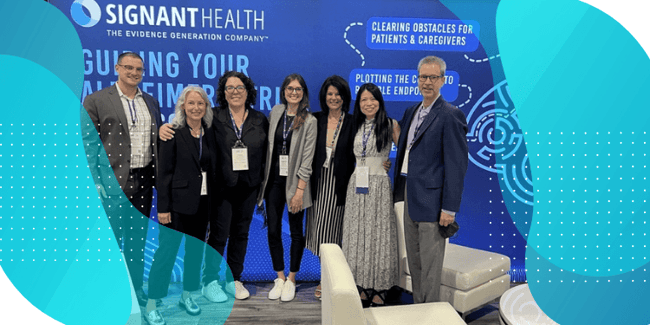Reflections from AAIC 2024: Innovation, Engagement, and the Future of Alzheimer’s Research

Our team recently discussed key takeaways from the Alzheimer’s Association International Conference (AAIC) 2024, and the conversation revealed a few noteworthy highlights.
AAIC highlighted emerging research trends, such as biomarkers, regulatory hurdles that Alzheimer's drugs face in the EU, attendee interest in prescreening tools like computerized cognitive testing (using tools like the latest release of Signant SmartSignals® CDR System®), nutrition-gut health, and conference interactions at our posters.
Biomarkers are vital in Alzheimer’s research, offering insights into disease progression and potential therapeutic targets. At AAIC, a new blood test, based on a composite of Tau and amyloid protein measures, gained attention for its ability to detect Alzheimer’s more accurately and earlier than current diagnostic methods. This advancement, along with the continued focus on key biomarkers like Tau and amyloid proteins, enables researchers and pharmaceutical developers to design targeted interventions, monitor their efficacy, and refine therapeutic approaches to combat Alzheimer’s disease more effectively.
Alzheimer’s drugs face significant regulatory hurdles in the EU, where stringent cost-benefit analyses, safety concerns, and market approval challenges can impede their entry into the market. The European Medicines Agency (EMA) closely scrutinizes new therapies, requiring robust evidence of both clinical efficacy and safety. In contrast, the regulatory landscape in the US, governed by the FDA, can be more flexible. The FDA has shown a willingness to grant accelerated approvals based on surrogate endpoints, such as biomarker data, even if long-term outcomes are not fully established. This has allowed some Alzheimer’s drugs to reach the market more quickly in the US, albeit often with post-market surveillance requirements. These differences highlight the challenges of navigating the regulatory environments in different regions, with the EU adopting a more conservative approach compared to the more adaptive strategies seen in the US
The Cognitive Drug Research System (CDR System®) platform holds significant potential for application in larger or earlier-phase studies in Alzheimer’s research. The computerized testing tools can efficiently identify participants with specific cognitive profiles, ensuring that trials are populated with individuals who are more likely to benefit from the investigational therapies being studied. By utilizing computerized assessments, CDR System enables rapid, objective, and standardized evaluations of cognitive function, which is crucial in early detection and tracking of Alzheimer's progression.
While this was not directly related to the conference, our roundtable attendees highlighted the role of gut health in Alzheimer’s disease. The conversation provided an interesting perspective on how holistic approaches to Alzheimer’s care, such as nutrition and gut health, are gaining attention.
As we continue to innovate related solutions and engage with the Alzheimer’s research community and our Scientific Advisory Board, it’s important to highlight the posters we presented at AAIC.
These posters cover critical aspects of Alzheimer’s disease research and data quality:
- Impact of Rater Change on MMSE Data: A Post-Hoc Analysis (Alan Kott)
- Impact of Site Size on Data Quality in Early Alzheimer’s Disease in Clinical Trials (Alan Kott)
- MMSE and CDR Score Changes and Potential Score Inflation in Multinational Alzheimer’s Disease Trials (Amanda Hackebeil)
- Geo-cultural Variation in MMSE Score Changes from Screening to Baseline in Alzheimer’s Disease Trials (Sayaka Machizawa)
We invite you to explore these posters to learn more about our latest findings.
For more insights or to connect with our team, feel free to reach out to any of our AAIC 2024 attendees:
- Alan Kott, MUDr
- Amanda Hackebeil, M.S., CCRC
- David Miller, MD, MA
- Erica Appleman, Ph.D.
- Gila Barbati
- Helen Brooker
- Jennifer Betz
- Jessica Stenclik, Ph.D., ABPP
- Linda Berkowitz
- Manuela Bossi, Ph.D.
- Marcela Roy, MA, AAC
- Margot Oakley, RN, MSN
- Maria Kerwin
- Matthew Cordaro, MBA
- Rosalie Smith, MBA, MSML, PMP
- Sandra Marticio
- Sayaka Machizawa, Psy.D.


.png?width=363&height=228&name=blog%2011%20(3).png)